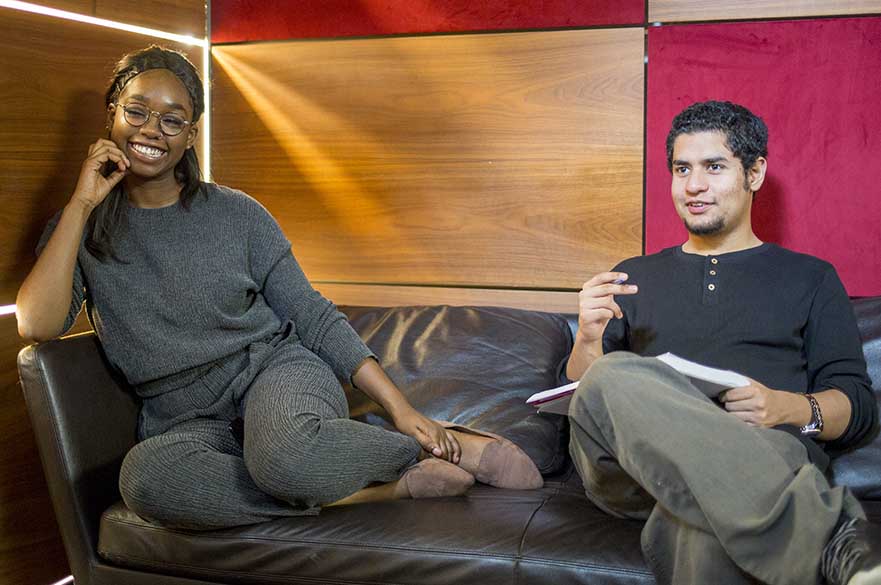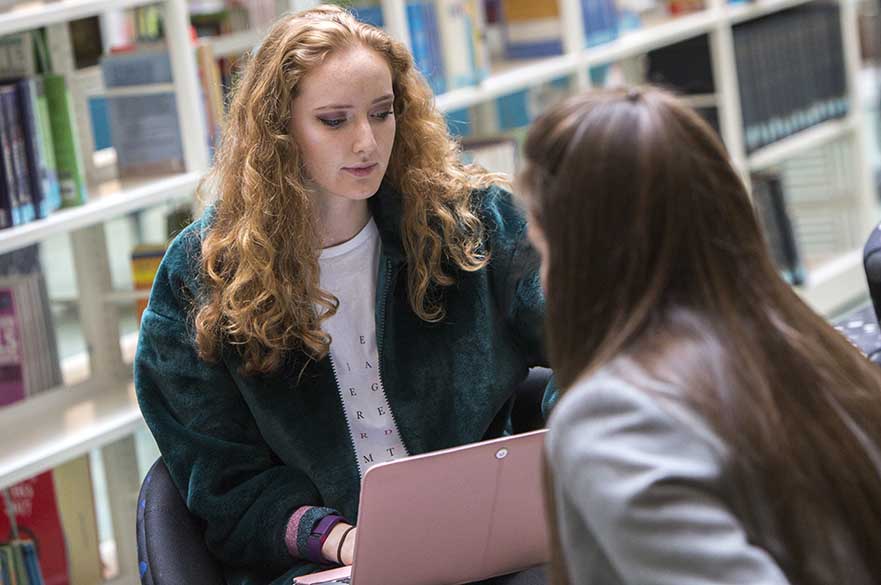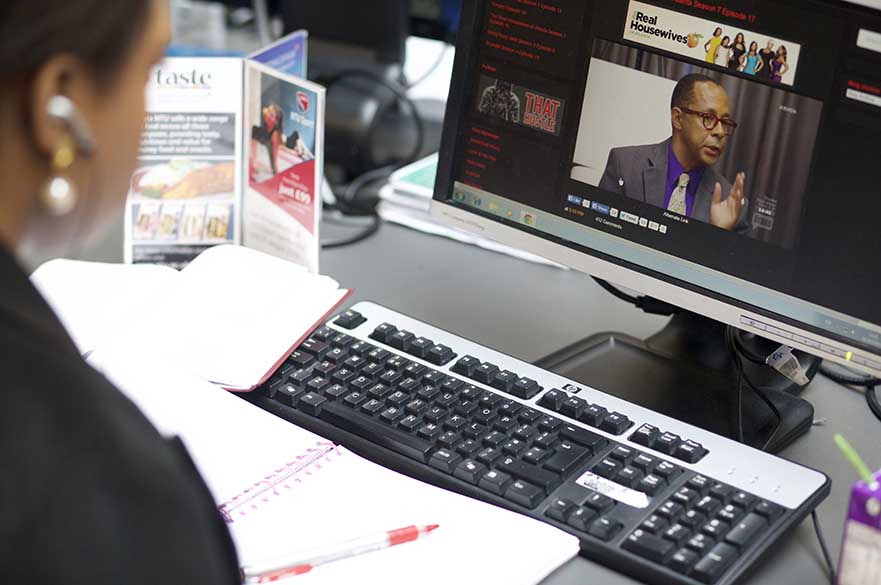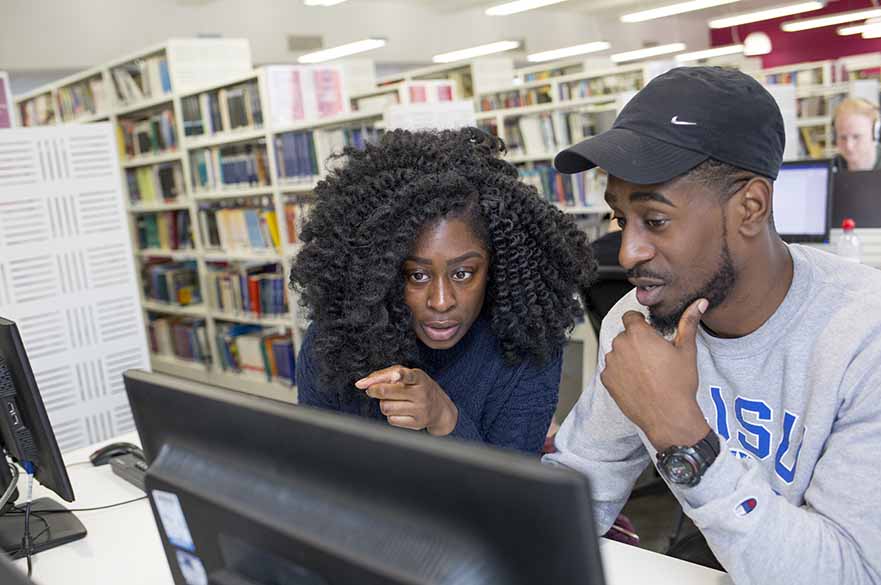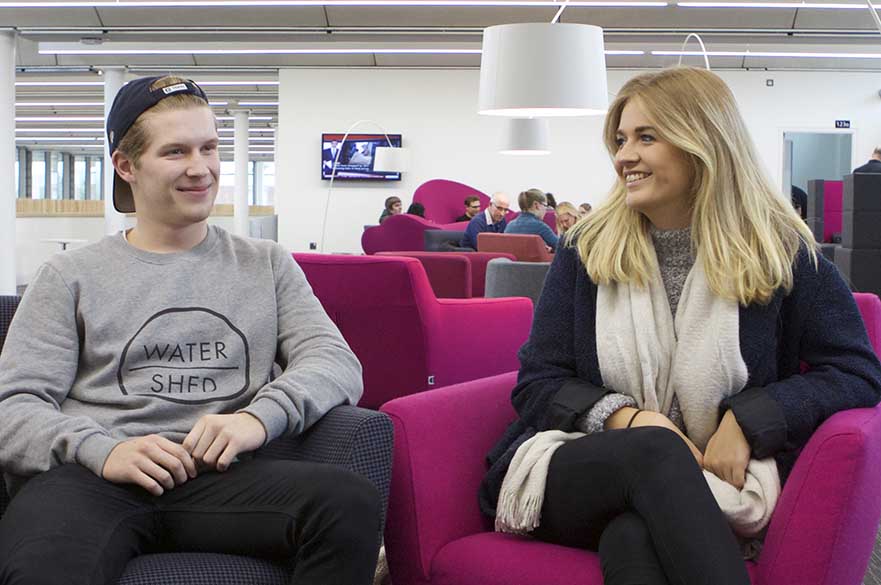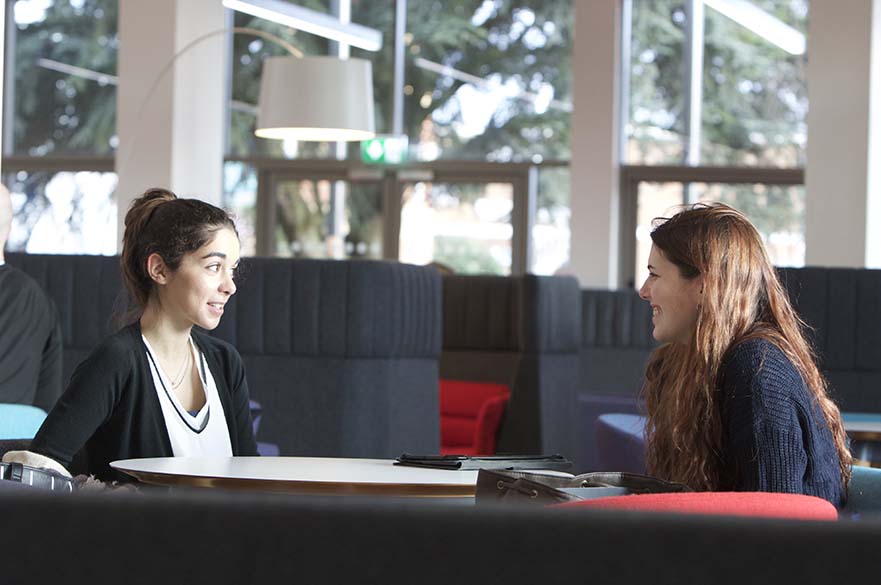This course is in Clearing
Offers from 80 tariff points
About this course
Media have penetrated into every corner of our lives. Learn about the processes involved and the fundamental questions that they raise.
The joint honours degree in Media and Philosophy will develop your skills as reflective and independent communicator who is conceptually aware, intellectually confident, and media savvy. This fully interdisciplinary programme will furnish you with the critical and creative thinking skills needed to analyse, understand, and evaluate the major problems of contemporary global society, its sources of power and influence, as well as the problem solving and teamworking skills needed to thrive within the graduate workplace.
You will be able to study modules in media theory and practice, alongside modules in applied ethics, political philosophy, the philosophy film and media, global philosophy and the philosophy of language and communication.
The course has been designed for those who want to explore the deeper and more fundamental dimensions of our mediated lives in ways that position them to emerge as the critical professionals of the future, capable of challenging the present in order to open up possibilities for change. You will have the opportunity to work with some of the leading practitioners and thinkers in these fields in ways that will challenge you to think differently about the world in which we live.
What you’ll study
Each year you’ll study a number of core modules from the lists below and you’ll have the opportunity to select from a range of optional modules to give yourself a more specialised pathway, depending on your interests.
In the second half of Year Two you can take your learning into your own hands and choose an extended work placement, learn at one of our many partner institutions worldwide, or continue to study here with a wide range of interesting optional modules to choose from.
Work-like experience
Work-like experience is embedded throughout your degree, ensuring that you are given multiple opportunities across three years to develop your career goals and build the skills and experience needed to achieve them. These embedded work-like experience opportunities are much more than a placement, and ensure that you develop the skills and competencies that employers demand. You will take part in a minimum of 240 hours of work-like experience during your course, with the option to take an extended 10-week work placement in your second year.
What does work-like experience mean?
Work-like experience defines a wide range of activities which will build your skills and hone your confidence to prepare you for a professional career after graduation. You will be given opportunities to engage in client-led projects, volunteering, consultancy, professional development, vocational training, project management and team work. You will expand and enhance your creative and communications skills through practical projects, producing podcasts and videos, organising campaigns, curating social media content and visual media. This rich and diverse experience will ensure that you graduate with the skills and confidence to thrive in your own career path.
Transformation modules
Each year you will take a core collaborative module. These modules are linked and will build on each other to ease you into University life, support you with mentoring and personal tutoring, begin your professional development, and expand your horizons with collaborative projects and assessments both within your subjects and wider afield.
Core modules
Analysing Media Texts
Be introduced to classic and contemporary methods of critical textual analysis. You’ll explore a range of different media texts, from film to TV, advertising, video games, music, and news media, and will encounter some key concepts needed to make sense of them. You’ll also examine how identities relating to race, class, sexuality, and gender are constructed across the field of popular culture.
Understanding Media Industries
Learn the essential theoretical and conceptual vocabulary needed to make sense of current trends in the media industries landscape, both nationally and internationally. You will explore questions relating to media ownership, organisation, power and control. Guest speakers will bring a new dimension to your learning by introducing real industry contexts, and by identifying the skills and competencies employers are looking for.
Ethics in the 21st Century
Examine the major approaches to moral theory. Learn about utilitarianism, Kantian deontology, and virtue ethics in order to examine the central problems of 21st Century applied ethics. These will include problems in environmental ethics and sustainability, business ethics, and the ethics of inclusion and diversity. Write a report on one of the major ethical issues of today, proposing a solution.
Knowing the Self: From Wonder to Wisdom
Explore the idea of the self and its virtues in ancient Greek and Roman thought. Study the ideas of Plato, Aristotle, and the philosophers of Hellenistic Schools. Learn how ancient philosophy can be viewed as a means of knowing and perfecting the self that allows individuals to see themselves as belonging to something more fundamental and significant.
Transformation: Agency and Self
The Humanities Research Project provides you with the opportunity to work with and further develop the combined knowledge and skills you have gained across your academic subjects to create a substantial and independent piece of interdisciplinary research. Supervised by academic staff, you will develop your own research topic, approach to the research and to the research outcome, delivered either through a 10,000-word dissertation or a substantial creative project with an accompanying 4,000-word essay. You are encouraged to approach your research project entrepreneurially; how might your research project contribute to future career opportunities and/or further study?
Optional modules typically include - choose one
Practicing Media Literacy
Explore the fundamentals of media practice through a combination of technical training, experimentation and analysis. You'll start to build your media production portfolio and learn how to use industry technology and software.
Issues in Applied Philosophy
This module examines the philosophical aspects of everyday life, exploring themes like self-alienation, ignorance, and meaning-making. It highlights philosophy's role in understanding power structures and resistance within daily practices. Students develop critical and interdisciplinary thinking, applying philosophical methods to personal and societal challenges, fostering skills for real-world problem-solving and transformation.
Core modules
Media, Theory and Society
Develop your knowledge of theoretical approaches to understanding the media and culture. This module will help you to understand some of the key theoretical approaches that are used in the study of media, communication and culture. You'll develop a familiarity of important theoretical approaches used in contemporary media and for the use of cultural analysis.
World Philosophy
Explore philosophical themes and perspectives from around the world. Develop an appreciation of the global reach and significance of philosophical perspectives and modes of inquiry - focusing on the universalism/relativism debate, the nature of the relationship between western philosophy at its non-western ‘others’, as well as philosophical themes in Judaism, Islam, Chinese Philosophy, Buddhism and Japanese Philosophy.
Transformation: Agency and World
This second-year module enables you to develop your understanding and practice of interdisciplinary study through a focus on the role and value of the humanities for understanding and engaging with sustainable futures and the future of work, beginning with addressing challenges we face in the present and actions we might take. Interrogating local, national, and global sustainability frameworks from a multi- and interdisciplinary perspective, the module provides an opportunity for you to bring together both of your subjects to address questions of sustainability and enterprise in a variety of sectors and contexts. The module enables you to reflect on your own place within these debates and their relation to your academic, personal, and professional development. As part of the module all students will complete an 80-hour work placement experience. You will be assessed through a professional portfolio and placement report.
Optional pathways
Pathway 1: Extended work-like experience
Get the experience you need for after you graduate, and really understand how the things you study translate into the world of work with a work placement. Your highly experienced Employability Team will help you find a placement to suit your career goals from our huge network of companies, charities, institutions, and beyond.
Pathway 2: An international exchange
Travel the world, meet new friends, and have experiences you will remember for the rest of your life.
Our flexible curriculum has been designed to allow some amazing opportunities for you. Your second year of study is divided into two semesters, giving you the opportunity to take part in an international exchange. You could study with one of international exchange partners in Australia, Europe, USA, Canada, Thailand and many, many more.
Our dedicated team will support you in finding and arranging a suitable exchange. And don't worry about the cost, they will help you apply for any grants or loans you may need, as no one should miss out on the chance to broaden their horizons.
Pathway 3: Taught modules
Interdisciplinary optional modules typically include:
Intercultural Communication at Work
Gain the knowledge, skills and strategies to build your intercultural communication competence. Analyse and reflect on the impact of culture(s) on your values, assumptions, perceptions, expectations, and behaviours. Build successful verbal and non-verbal communication strategies in different intercultural settings.
People and Planet: pasts, presents, and futures
In this module you will develop an understanding of the human impact on the environment from the 15th Century to the present as a form of slow but sustained violence enacted against the planet. It will also explore how such long-term change can interact with social justice in the present day.
Media optional modules typically include:
Analysing Popular Music
Analysing Popular Music has two major concerns: firstly, to develop a social understanding of transatlantic popular music; and secondly, to develop a cultural-historical perspective on its development over the past hundred years and more. This module introduces you to theoretical approaches to the study of popular music, allowing you to engage in independent critical analysis of popular music and popular musical cultures.
Researching Media and Communications
This module introduces the key methods and analytical approaches of media and cultural studies. It enables you to design and produce original research projects, and to gain deeper understanding of the research methods you might use in your final year dissertation. It outlines a range of methods (including textual analysis, ethnography, and critical discourse analysis), and shows how these can be implemented to particular case studies from the media and other cultural practices.
Short Film Production and Exhibition
Enhance your production skills through the creation of a short film. You will use a range of equipment and practical craft techniques to your idea from creation, through professional planning, filming, and editing to promotion and festival entry. You will be supported in a variety of roles in your team with professional advice from practice-based academic tutors and our technical team.
Philosophy optional modules typically include:
How to Win Every Argument
Develop the key critical thinking skills needed to assess reasons, solve problems, and construct compelling arguments, with a focus on how to apply these skills in everyday life and in a professional setting. Learn the skills of persuasive speaking and understand how to detect logical fallacies and critically assess some of our most deeply held beliefs about ourselves and the world.
Happiness and Mental Health: Philosophy, Psychotherapy and Psychoanalysis
Examine the roots of the current mental health crisis and how key philosophical techniques, both ancient and modern, can be deployed in order to alleviate mental health symptoms. Explore philosophical roots of psychotherapeutic treatments and interventions and learn of how ancient Greek philosophy provide the basis for happier and more fulfilled lives.
You may choose to take an optional year-long placement in Year Three, either in the UK or overseas.
You will be supported by our experienced Employability Team to source a suitable placement.
Core module
Major project
For your major project in your final year of your studies, you can choose to undertake a project in either one of your two Joint Honours subjects.
Philosophy Major Project
The Philosophy Major Project will provide you with an opportunity to study a self-chosen philosophical topic in depth guided by expert supervision. It will assist you in reflecting on the academic knowledge, creativity, and professional skills that you will have acquired in the first two years of study, in a way that fosters your intellectual authenticity, alongside a deeper appreciation of the contemporary relevance of philosophically informed modes of questioning, thinking, arguing, and concept creation. The ability of Philosophy to shape today's emerging social, cultural, and political agendas will also be a key focus of your project.
Media Major Project
For your Media Major Project, you will have the opportunity to develop your own research skills and interests in significant depth. Acting as the culmination of your learning journey, your project will be creative and individualised, allowing you to produce a wide range of projects tailored to their specific media interests. You may choose to develop a practical project in the form of a podcast, photography portfolio, short film, piece of videography or creative writing. You may also choose to produce a long-form research essay. Recent focus topics have included projects on representations of masculinity in contemporary television series such as Ted Lasso, the relationship between advertising, femininity and consumption, the online “fandoms” of musician Harry Styles, and a photography project centred on women’s experiences in exercise-related spaces.
Humanities Research Project
The Humanities Research Project provides you with the opportunity to work with and further develop the combined knowledge and skills you have gained across your academic subjects to create a substantial and independent piece of interdisciplinary research. Supervised by academic staff, you will develop your own research topic, approach to the research and to the research outcome, delivered either through a 10,000-word dissertation or a substantial creative project with an accompanying 4,000-word essay. You are encouraged to approach your research project entrepreneurially; how might your research project contribute to future career opportunities and/or further study?
Transformation: Agency and Social Change
This final-year module challenges you to consider the role and value of interdisciplinary research through your academic subjects in advocating for and achieving meaningful social change at different scales. Building on your first- and second-year studies, you will conceptualise, develop, and deliver your own interdisciplinary approach to a live brief focused on an aspect of social change, considering the role of issues such as ethics, justice, power, rights and inequalities, reflecting on the role that is played, or could be played, by humanities disciplines in addressing these global issues. The module also provides you with an opportunity to bring together and reflect on your personal, academic and professional development throughout your degree. For this module you will be assessed through a creative project based on a live brief, and a piece of reflective writing focused on planning for your future beyond undergraduate study.
Media optional modules typically include:
Lifestyle and Consumer Culture
This Media module develops your knowledge of interdisciplinary approaches to consumption. We will investigate how lifestyles and consumer culture contribute to changing cultural identities and social hierarchies. We will interrogate key concepts such as ‘taste’, ‘choice’ and ‘authenticity’ in a world that encourages individuals to become their own self-brands. Key issues include the ‘experience economy’, commodity activism and cultures of neoliberal enterprise and austerity. Through assessment you will make sense of your own experiences in consumer society and produce a detailed piece of cultural analysis.
Client-led Media Production
During this module you'll be able to focus on the development of skills in media production by completing a media project that will be set to a 'real brief'. This is an opportunity for you to enhance your employability options by participating in live projects with a real purpose. This module will encourage you to make connections between theory and practice.
The Body and Popular Culture
Explore representations of the body across a diverse and contemporary range of cultural forms. By applying theoretical perspectives on different bodies in popular cultural to a wide selection of case studies, you will investigate the way that bodies are used and located within the media, addressing themes of gender, race, identity, celebrity bodies, ageing bodies, cyborgs, sexualised bodies, and more.
Philosophy optional modules typically include:
Philosophy, Film and Media
Examine the specificity of film and media and their relationship with philosophy by exploring the power of mediating processes and their role as a transmitter of philosophical material. Consider the status of the media artefact and its capacity to shape and inform contemporary identities and experiences. You will also have the opportunity to study philosophical films. Understand the way in which philosophical discourses are able to shape, inform and critique contemporary media practices, experiences and cultures.
Being Good: The Foundations of Morality
Why be morally good? This question has been at the centre of philosophical debate for over two thousand years and has received a host of radically different and distinctive answers from thinkers across space and time. This module will examine and critically assess a key selection of these different views, and then consider their applications to contemporary ethical paradigms regarding moral status and equality.
Language, Communication and Power
What is the nature of linguistic meaning? How does language encode thought? How is language used as a tool for getting things done? Each of these questions have received considerable attention from philosophers, and this module will cover some of the main themes. You will address key issues in semantics and pragmatics, and study philosophical work in this area, including that of Frege, Russell, Wittgenstein, Grice, and Foucault.
We regularly review and update our course content based on student and employer feedback, ensuring that all of our courses remain current and relevant. This may result in changes to module content or module availability in future years.
Video Gallery
How you're taught
How will I learn?
Teaching takes a variety of forms and during your degree you will experience many different types of learning activities. Some of our modules are delivered entirely online, allowing you the flexibility to study at a time that is convenient to you. Other modules use interactive lectures and workshops that are supplemented by smaller group sessions, including:
- seminars
- tutorials
- problem-solving workshops
- training workshops
- hands-on practice
- group projects and presentations
- guest speakers
- field work
You will also be able to take part in lots of extra-curricular activities outside your course, including debating, research seminars, student challenges, Sustainability and careers training, sports, student societies and much, much more.
Study abroad in Year Two
You’ll have the option to take part in an international exchange at a partner university in the second half of Year Two. This will enable you to gain impressive international experience, and broaden your perspective and career ambitions.
You’ll experience other cultures, travel the globe and open your eyes to a world of opportunities. Our exchange partnership with a number of international universities enables you to live and study in another country in your second year. Find out more about international exchange and study abroad.
Learn a new language
Alongside your study you also have the opportunity to learn another new language. The University Language Programme (ULP) is available to all students and gives you the option of learning a totally new language or improving the skills you already have. Learning a new language can enhance your communication skills, enrich your experience when travelling abroad and boost your career prospects. Find out more about the University Language Programme.
Supporting you
If you’re struggling with a topic or require additional support or guidance, you can arrange to see your tutors in small groups or one-to-one, to discuss essay plans or to seek some specific academic guidance.
It is the nature of the subjects offered in the School of Social Sciences, however, that much of your time will be spent engaged in independent study. We recognise that this marks a change of culture from school or college, and we have in place a system of study support to help you adapt to this.
How you're assessed
We use a varied and diverse range of coursework assessments to develop your skills and support your progress. These include digital projects, reviews, case-studies, essays, presentations and reports.
Our innovative approach to assessment means that in Year One you will develop and enhance a complementary set of key skills for success in second and third year, and throughout the degree the varied assessment pattern will enable you to engage with the past and prepare for your future through an exciting array of projects
Contact hours
If you’re struggling with a topic or require additional support or guidance, you can arrange to see your tutors in small groups or one-to-one, to discuss essay plans or to seek some specific academic guidance.
It is the nature of the subjects offered in the School of Social Sciences, however, that much of your time will be spent engaged in independent study. We recognise that this marks a change of culture from school or college, and we have in place a system of study support to help you adapt to this.
Careers and employability
Your career development
This is a major part of the curriculum, recognising the importance of University study as a route into graduate level careers. We don’t expect you to have a target career from the outset, but we will support you to develop your career aspirations, and provide multiple opportunities for you to work towards this, during your degree.
The structure of your degree, the assessments that you will undertake, and the opportunities we provide are designed to help you develop key transferable skills and competencies demanded by employers. We work very closely with a range of employers, and many employers helped shape our degrees. Our courses provide lots of opportunities for you to develop your own links with organisations and potential employers.
Joint honours humanities students develop a wide range of complementary skills. These include key skills of communication, project management, analysis, creativity, digital skills, collaboration and leadership, with a strong emphasis on sustainability and inclusivity. Through this course you’ll become more confident and self-motivated, be able to work independently and in teams, and develop excellent time management skills.
Recent Media graduates have also gone on to work in graduate-level positions with:
- the BBC;
- Sky;
- Brit Asia TV;
- Channel 5; and
- IBM.
Many graduates also choose to undertake further study on one of our Masters-level courses or MPhil and PhD research degrees.
What our students are doing now
Suzannah Page
Suzannah Page
Campus and facilities
You’ll mainly be studying in the Djanogly building with access to facilities including a student kitchen and collaboration space.
NTU’s City Campus has everything you’ll need to stay busy between lectures. As well as the Boots Library and its beautiful roof garden, there’s our stylish Students’ Union building and two-storey, 100-station gym; a whole host of cafés, bars, restaurants and food outlets for every taste; our much-loved Global Lounge; performance and rehearsal spaces for musicians; and much, much more!
Take a few steps off campus and you’ll find yourself in the heart of Nottingham — England’s original ‘rebel city’. It’s one of the UK’s top 10 student destinations, and one of Europe’s top 25. Enjoy a booming indie arts scene, pop-up galleries, the nationally renowned Nottingham Contemporary, two A-list theatres, the iconic Broadway (voted one of the world’s top 100 independent cinemas by Total Film), and a constant rotation of events and exhibitions.
Take our virtual tour to get a real feel for the campus.
Here are some of the free services, student discount and benefits you'll get studying at NTU
We've carefully considered what benefits and services you need for your studies, so when you join NTU you'll get free printing and materials credits, access to our free WiFi, a copy of Microsoft Office, and can even borrow a laptop if yours is out of commission.
For life outside your lectures, you'll enjoy access to over 60 sports clubs and 130 student societies, discounted travel and bike hire, free language learning, award-winning student support and an entertainment programme which is second to none.
See all the benefits and free services you will enjoy as an NTU student.
Societies
Current students run societies in a range of Humanities and Arts subjects including History, Medieval, Film, Filmmaking, Philosophy, Politics and International Relations, and the Book society.
There are also a number of media channels which our students get involved in such as the NTU radio station FlyLive, our student magazine Platform, and TV station TrentTV.
Find out more about student societies at the Student Union website.
Entry requirements
This course is in Clearing
Looking for a place in Clearing? We are accepting application and would love to hear from you!
UK students
This course is in Clearing
Looking for a place in Clearing? We are accepting applications and would love to hear from you!
Clearing requirements
From 80 UCAS tariff points from up to 4 qualifications.
To discuss our entry requirements and see what we can offer you, call us now on +44 (0)115 848 6000. Alternatively, if you already have your qualifications, apply online via our Clearing Application form.
Preparing for results day? Beat the queue and sign up for NTU Priority for up-to-date information about all things Clearing. You’ll get an offer ahead of Clearing, subject to you achieving the required grades on results day.
To find out what qualifications have tariff points, please use our tariff calculator.
Additional requirements for UK students
There are no additional requirements for this course.
Contextual offers
If you don’t quite meet our entry requirements, we might be able to make you a lower offer based on a range of factors, including your background (such as where you live and the school or college you attended), your experiences and your individual circumstances (you may have been in care, for example). This is called a contextual offer, and we get data from UCAS to help make these decisions. We do this because we believe everyone with the potential to succeed at NTU should have the opportunity to do so, no matter what barriers you may face.
Meeting our entry requirements
Hundreds of qualifications in the UK have UCAS Tariff points attached to specific grades, including A-levels, BTECs, T Levels and many more. You can use your grades and points from up to four different qualifications to meet our criteria. Enter your predicted or achieved grades into our Tariff calculator to find out how many points your qualifications are worth.
Other qualifications and experience
NTU welcomes applications from students with non-standard qualifications and learning backgrounds, either for year one entry or for advanced standing beyond the start of a course into year 2 or beyond.
We consider study and/or credit achieved from a similar course at another institution (otherwise known as credit transfer), vocational and professional qualifications, and broader work or life experience.
Our Recognition of Prior Learning and Credit Transfer Policy outlines the process and options available for this route. If you wish to apply via Recognition of Prior Learning, please contact the central Admissions and Enquiries Team who will be able to support you through the process.
Getting in touch
If you need more help or information, get in touch through our enquiry form.
International students
This course is in Clearing
Looking for a place in Clearing? We are accepting applications and would love to hear from you!
Clearing requirements
From 80 UCAS tariff points from up to 4 qualifications.
To discuss our entry requirements and see what we can offer you, call us now on +44 (0)115 848 6000. Alternatively, if you already have your qualifications, apply online via our Clearing Application form.
Preparing for results day? Beat the queue and sign up for NTU Priority for up-to-date information about all things Clearing. You’ll get an offer ahead of Clearing, subject to you achieving the required grades on results day.
Additional requirements
English language requirements: See our English language requirements page for requirements for your subject and information on alternative tests and Pre-sessional English.
Additional requirements for international students
If you need help achieving the academic entry requirements, we offer a Foundation preparation course for this degree. The course is offered through our partner Nottingham Trent International College (NTIC) based on our City campus.
English language requirements
View our English language requirements for all courses, including alternative English language tests and country qualifications accepted by the University.
If you need help achieving the language requirements, we offer a Pre-Sessional English for Academic Purposes course on our City campus which is an intensive preparation course for academic study at NTU.
Other qualifications and experience
If you have the right level of qualifications, you may be able to start your Bachelors degree at NTU in year 2 or year 3. This is called ‘advanced standing’ entry and is decided on a case-by case basis after our assessment of your qualifications and experience.
You can view our Recognition of Prior Learning and Credit Transfer Policy which outlines the process and options available, such as recognising experiential learning and credit transfer.
Sign up for emails
Sign up to receive regular emails from the International Office. You'll hear about our news, scholarships and any upcoming events in your country with our expert regional teams.
Getting in touch
If you need advice about studying at NTU as an international student or how to apply, our international webpages are a great place to start. If you have any questions about your study options, your international qualifications, experience, grades or other results, please get in touch through our enquiry form. Our international teams are highly experienced in answering queries from students all over the world.
Policies
We strive to make our admissions procedures as fair and clear as possible. To find out more about how we make offers, visit our admissions policies page.



